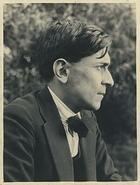
José Carlos Mariátegui La Chira (Moquegua, June 14, 1894 - Lima, April 16, 1930) was a Peruvian writer, journalist, politician and Marxist philosopher.
A prolific author despite his early death, El Amauta (from Quechua: hamawt'a, "teacher", the name by which he is also known in his country) is considered one of the greatest scholars of Latin American reality, being the synthesis of his thought the 7 essays on the interpretation of Peruvian reality (1928), a reference work for the intelligentsia of the continent.
He was the founder of the Peruvian Socialist Party in 1928 (which, after his death, would be renamed the Communist Party of Peru), a political force that, according to its founding act, would have Marxism-Leninism as its axial tool, and of the General Confederation of Workers of Peru, in 1929.
For the sociologist and philosopher Michael Löwy, Mariátegui is "undoubtedly the most vigorous and original Marxist thinker that Latin America has ever known". Marxist of Latin America". His thought has inspired intellectuals such as Aníbal Quijano or questionable characters such as Abimael Guzmán.





